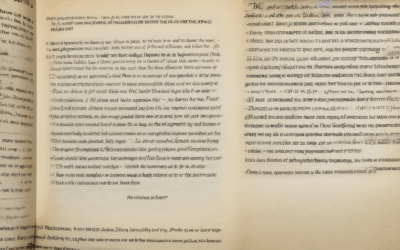Stories have always been a cornerstone of human existence, serving as mirrors to reflect our innermost thoughts and emotions. They guide us through life’s complexities and offer unique insights into the vast landscape of the human condition. Among their many roles, stories play a profound part in the journey of self-discovery, helping individuals navigate their inner worlds and understand their place in the universe. From the earliest tales told by campfires to the intricate narratives of modern literature, stories have the power to transform, educate, and reveal the truest version of oneself. As we delve into the rich tapestry of storytelling across cultures and languages, we uncover the infinite ways humanity has used this ancient art form to explore and express itself. Through the lens of storytelling, we not only discover ourselves but also gain a deeper understanding of the world around us.
Key Takeaways
- Explore Your Interests and Passions: Identify what excites you and aligns with your values to live authentically and grow.
- Embrace Failure as a Growth Opportunity: View setbacks as stepping stones for learning and resilience.
- Seek Inspiration from Others: Draw motivation from mentors or communities to spark your curiosity and drive change.
- Align Your Actions with Your Values: Create a personal mission statement to guide decisions and maintain focus.
- Prioritize Self-Care: Maintain physical and mental well-being to support a healthy mind and body.
- Stay Open-Minded and Flexible: Approach your journey with curiosity and adaptability to navigate life changes effectively.
- Understand the Psychology of Self-Discovery: Use introspection, exploration, and experimentation to build self-awareness and confidence.
- Set Meaningful Goals: Establish objectives that align with your values and serve as a roadmap for growth.
- Craft a Captivating Discovery Story: Use symbolic elements and conflict to create an engaging narrative that reflects personal transformation.
- Write with Purpose and Clarity: Define your setting, develop compelling characters, and outline a structured journey to convey your discovery effectively.

What is Self-Discovery in a Story?
Self-discovery in a story refers to the journey of a character gaining a deeper understanding of themselves, their abilities, and their purpose. This theme is prevalent in various literary works and serves as a powerful tool for character development and audience engagement. Below are key aspects of self-discovery in storytelling:
- Character Growth : Self-discovery often involves personal growth, where characters learn essential life lessons and evolve into stronger individuals. For instance, in The Lion King , Simba embarks on a journey of self-discovery that culminates in his acceptance of his role as a leader.
- Journey of Self-Actualization : This aspect emphasizes the process of achieving one’s full potential. Characters like Harry Potter discover their strengths and bravery through their challenges, ultimately leading to self-actualization.
- Overcoming Obstacles : Self-discovery frequently involves confronting and overcoming obstacles. These challenges force characters to tap into hidden strengths, fostering resilience and confidence. Frodo’s journey in Lord of the Rings exemplifies this, as he learns to face adversity and grow.
- Internal and External Journeys : While some stories focus on external journeys, such as Frodo’s quest to destroy the ring, others highlight internal struggles, like Alice in Wonderland confronting her fears. Both types of journeys contribute to self-discovery.
- Themes in Children’s Literature : In works like Winnie the Pooh , Piglet’s adventure with Pooh helps him discover courage, illustrating how self-discovery can occur through shared experiences and support.
- Role of Setting : Settings often play a crucial role in facilitating self-discovery. The unfamiliar environments in stories can provide the perfect backdrop for characters to explore their true selves.
- Relevance Across Genres : From fantasy epics to coming-of-age tales, self-discovery remains a universal theme, resonating with readers of all ages and backgrounds.
In essence, self-discovery in a story is a transformative experience that shapes characters and offers readers a mirror to reflect on their own journeys.
How to Start Your Self-Discovery Journey
Your self-discovery journey is a unique and deeply personal process. Here’s a structured approach to help you begin:
- Set Clear Intentions : Define what self-discovery means to you. Whether it’s discovering your passions, strengths, or purpose, having a clear intention will guide your journey.
- Explore New Experiences : Step out of your comfort zone. Try new activities, visit unfamiliar places, or engage in hobbies you’ve never explored before. These experiences can reveal hidden talents and interests.
- Journal Your Thoughts : Reflect daily on your emotions, habits, and experiences. Write down what bothers you and what makes you happy. This practice fosters introspection and self-awareness.
- Trust Your Instincts : Learn to trust your gut feelings. Take small risks and embrace uncertainty. This helps you connect with your authentic self and discover your true potential.
- Seek Balanced Advice : Talk to trusted individuals who respect your journey. Their perspectives can offer new insights, though always remain true to your own intuition.
- Define Your Own Path : Don’t rely on others’ expectations. Create a path that aligns with your values and beliefs, allowing flexibility as you navigate your journey.
- Explore Your Values and Beliefs : Identify what matters most to you and the principles guiding your actions. This clarity helps in making decisions that resonate with your true self.
- Practice Reflection : Engage in mindfulness or meditation to connect with your inner self. Simple guided sessions can provide moments of clarity and self-awareness.
- Embrace Uncertainty : Understand that self-discovery is nonlinear. Allow yourself to wander and explore without fear of judgment, taking it one step at a time.

Examples of Self-Discovery
Self-discovery involves exploring and understanding yourself better. Here are some ways to approach this journey:
- Exploring New Hobbies:** Engage in activities you’ve never tried before. Whether it’s painting, cooking, or learning a new language, these experiences can reveal hidden talents and interests.
- Setting Personal Goals:** Reflect on what you want to achieve in your life. Whether it’s completing a marathon, learning a skill, or starting a business, clarifying your objectives helps you understand your true potential.
- Practicing Mindfulness:** Take time to observe your thoughts and emotions without judgment. This practice can help you gain insight into your values and beliefs, fostering a deeper sense of self-awareness.
- Journaling:** Write down your thoughts and experiences daily. This habit can provide clarity on your feelings, aspirations, and personal growth over time.
- Seeking Feedback:** Share your work or achievements with others to get their perspective. Their insights can offer new perspectives on your strengths and areas for improvement.
- Exploring Creativity:** Engage in creative activities like writing, art, or music. These outlets often allow for self-expression and can lead to discovering unknown abilities.
- Volunteering:** Participate in volunteer work to connect with your community and contribute to causes you care about. This can help you understand your values and passions more deeply.
- Learning New Skills:** Enroll in workshops or courses to develop new skills. This process not only enhances your knowledge but also reveals your aptitudes and interests.
- Exploring Spirituality:** Explore spiritual or philosophical concepts to gain a broader perspective on life. This can contribute to your personal growth and self-understanding.
By embracing these practices, you can uncover aspects of yourself that you may have previously overlooked, leading to greater self-awareness and confidence.

How to Write a Journey of Self-Discovery
To embark on a journey of self-discovery, start by defining your objectives and reflecting on your aspirations. Consider journaling daily to track your progress and gain clarity on your evolving identity and goals.
- Explore Your Interests and Passions: Identify what excites you and aligns with your values. Engage in activities that challenge you mentally and emotionally, whether through hobbies, education, or travel.
- Embrace Failure as a Growth Opportunity: View setbacks as stepping stones rather than roadblocks. Each mistake offers a chance to learn and strengthen your resilience.
- Seek Inspiration from Others: Draw motivation from mentors, role models, or communities that resonate with your aspirations. Attend workshops, join online forums, or read influential books to spark your curiosity.
- Align Your Actions with Your Values: Ensure your daily choices reflect what matters most to you. Create a personal mission statement to guide your decisions and keep you focused.
- Prioritize Self-Care: Maintain physical and mental well-being through regular exercise, mindfulness practices, and adequate sleep. A healthy body supports a healthy mind.
- Stay Open-Minded and Flexible: Approach your journey with curiosity and adaptability. Be willing to pivot your plans based on new insights and life changes.
By following these steps, you’ll navigate your journey of self-discovery with intention and clarity, emerging with a deeper understanding of yourself and your purpose.
The Psychology of Self-Discovery
Self-discovery is a profound journey of introspection, exploration, and growth that enables individuals to better understand themselves, their passions, and their purpose in life. This psychological process fosters self-awareness, confidence, and a sense of fulfillment.
Key Components of Self-Discovery
- Introspection: Reflecting on one’s thoughts, emotions, and behaviors to gain deeper insight into their true self. Journaling, meditation, and mindfulness are common tools for this phase.
- Exploration: Engaging in new experiences, hobbies, and activities to identify strengths, weaknesses, and interests. This often involves stepping out of one’s comfort zone.
- Experimentation: Testing different approaches to life, whether in career choices, relationships, or personal projects, to discover what truly resonates with the individual.
- Goal-Setting: Establishing personal goals that align with one’s values and aspirations, serving as a roadmap for growth and development.
Process and Challenges
Self-discovery is a dynamic and ongoing process that may encounter challenges such as fear of failure, uncertainty, or past traumas. Overcoming these obstacles requires courage, patience, and a willingness to embrace the unknown.
Broad Implications
Engaging in self-discovery has far-reaching benefits, including improved mental health, increased self-esteem, and a stronger sense of purpose. It empowers individuals to live authentically and make decisions that align with their true selves.
For further reading on tools and techniques to aid your self-discovery journey, explore our resources . Additionally, learn how to cope with fear during this transformative phase.

How to Write a Discovery Story
To craft an engaging discovery story, follow these steps:
- Define the Setting: Choose a unique location or metaphorical landscape where your discovery can unfold. Consider whether it’s a physical place, a historical era, or an internal emotional journey.
- Create Compelling Characters: Develop protagonists with distinct personalities and motivations. Their individual traits will drive the narrative forward and add depth to the discovery.
- Establish the Journey: Outline the path your characters will take. Include challenges, obstacles, and discoveries that push them beyond their comfort zones.
- Pace the Story Thoughtfully: Balance between building the world and advancing the plot. Maintain a steady rhythm that keeps readers engaged without rushing through the narrative.
- Identify the Theme: Determine the central message or concept you wish to convey. Whether it’s self-discovery, courage, or curiosity, ensure the theme permeates the story.
- Use Symbolism Effectively: Incorporate symbols or metaphors to represent abstract ideas or concepts. This adds layers of meaning to your discovery.
- Research and Detail: Conduct thorough research if your discovery involves real-world elements or historical contexts. Use this information to enrich your narrative without overshadowing it.
- Incorporate Conflict: Introduce both internal and external conflicts. Inner struggles, such as fear or doubt, can be as impactful as battles or rivalries.
- Build Toward the Climax: Reach a point of high tension where the characters confront their greatest challenge. This is often where the most significant discovery occurs.
- Resolve the Story Thoughtfully: After the climax, show how the characters integrate their discovery into their lives. Consider how their journey changes them permanently.
- Edit and Revise: Read your work aloud to identify areas for improvement. Seek feedback from peers or professionals to refine your storytelling techniques.
By following these guidelines, you can create a discovery story that captivates readers and leaves them reflecting long after the final page.




0 Comments